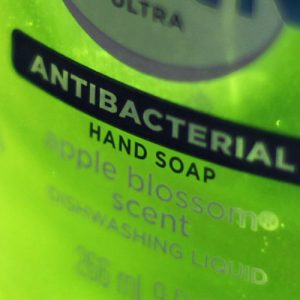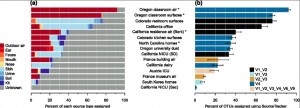Two recent news articles cover some new attempts at curbing antimicrobial resistance. The first discusses Kaiser’s ban on 13 different antimicrobials that are commonly used on surfaces, like fabrics and finishes. Although this change will only affect future facilities, it is a step forward in reducing sources of antimicrobial resistance. This is especially important in hospitals, …
As some QIIME users may be aware, we’re starting to think about our transition from QIIME 1 to QIIME 2. We want to briefly share our thoughts about this transition so the QIIME user community has an idea of what to expect as we start this process. See our post, Toward QIIME 2, on the QIIME …
The latest papers on microbiome of buildings and other objects used by humans. Today, we have microbiomes of water reservoirs and plumbing pipes, Brazilian money notes, an Italian cheese factory, and a brewery. For more microbiome papers from other sources (both human-associated or environmental), check out my daily blog MicrobiomeDigest.com. Impact of Water Chemistry, Pipe …
When we think of the built environment, we usually only include the indoor surfaces and air. A new study (preprint) posted last week on BioRxiv went through the roof, and looked at the microbes living on solar panels. A highly diverse, desert-like microbial biocenosis on solar panels in a Mediterranean city – Pedro Dorado-Morales, Cristina Vilanova, Juli …
Gearing up the UNITE database for the built mycobiome The team behind the UNITE database for molecular identification of fungi has been granted support from the Sloan Foundation to strengthen the support for fungi from the built environment. Launched in 2001 as an ITS database for identification of ectomycorrhizal fungi in the Nordic countries, UNITE …
This week’s antimicrobial news story covers an antimicrobial 3D printing material that has the potential to be used for tooth implants and other dental products. It is made of a dental polymer that is imbibed with ammonium salts. The creators claim their material kills 99% of bacteria, and will curb infections that result from dental procedures. However, …
We expect people next door to be good citizens and would like to meet them before moving in. When it comes to the neighbors living in our tap water, precaution is especially in order. In the “Microbial Neighbors in your Tap Water” series, our PLoS ONE paper released today introduces these invisible neighbors- the building …
Every year for the last few years I have given a talk on the “Evolution of DNA Sequencing” at the “Workshop in Applied Phylogenetics” at Bodega Bay Marine Lab. I just did the talk and thought I would post the slides here. I note – I also added an evolutionary tree of sequencing methods which …
A new paper from Adams et al does a meta-analysis of indoor microbiome data to further characterize the microbial interactions within the indoor built environment. They used sequence data from four studies that covered South Korean homes, Colorado restroom surfaces, Colorado kitchen surfaces, and North Carolina homes, and found that communities were most similar between the type …
New papers on microbes in water treatment plants and pipes. Microbes in pipes Revealing the microbial community structure of clogging materials in dewatering wells differing in physico-chemical parameters in an open-cast mining area – Juanjuan Wang – Water Research Iron rich deposits cause clogging the pumps and pipes of dewatering wells in open-cast mines, interfering …



